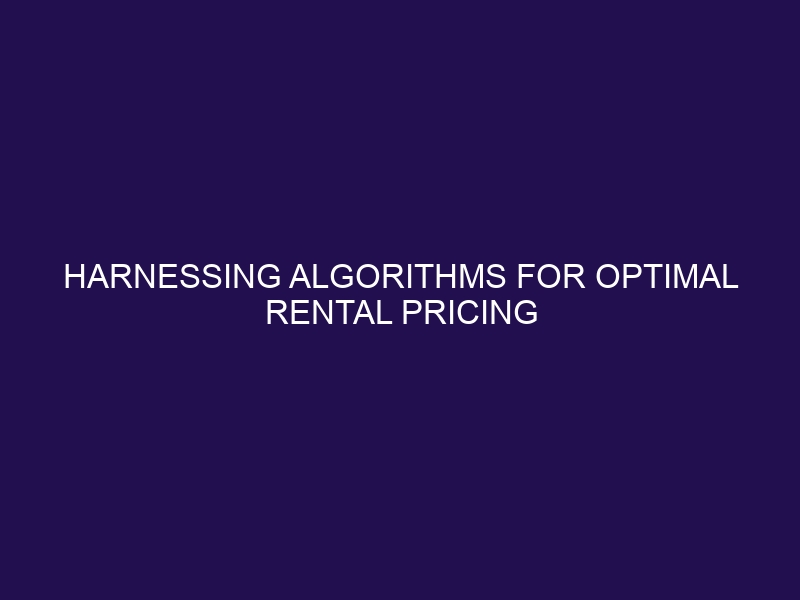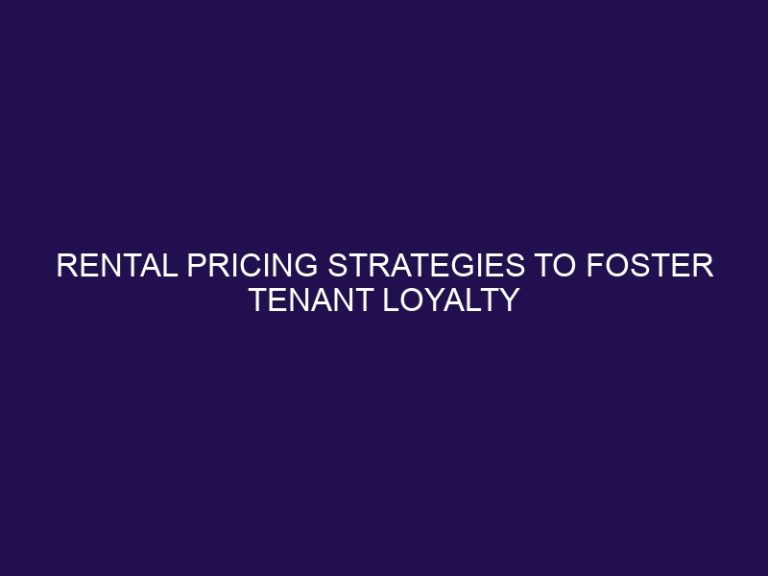Harnessing Algorithms for Optimal Rental Pricing
Algorithms are a set of step-by-step instructions or rules used to solve a problem or complete a task. In the world of property rental, algorithms can be utilized for rental pricing optimization, which is the process of determining the best possible price for a rental property to maximize revenue and occupancy rates.
As explained by renowned technology entrepreneur and investor, Marc Andreessen, algorithms work by taking in a set of data, processing it, and providing an output or solution. In the context of rental pricing, algorithms take into account various factors and utilize data analysis and predictive modeling to determine the optimal price for a rental property.
Rental pricing optimization is crucial for property owners as it directly impacts their revenue and occupancy rates. Setting the right price can attract more potential renters, while an incorrect price can result in financial losses and empty properties. The factors that affect rental pricing include location, demand, property features, and seasonality. Property owners must consider these factors and use algorithms to determine the optimal price for their rentals.
Algorithms can help with rental pricing optimization in several ways. Firstly, they can analyze large amounts of data, including market trends, competitor pricing, and property features, to provide accurate insights into the rental market. Additionally, algorithms can identify trends and patterns to predict future demand and recommend pricing adjustments. With the help of algorithms, property owners can make data-driven decisions and maximize their rental revenue.
Using algorithms for rental pricing optimization offers several benefits, including increased revenue, competitive pricing, and time efficiency. By setting the right price, property owners can attract more renters, resulting in higher revenue. Additionally, with the ability to analyze market trends and adjust pricing accordingly, property owners can stay competitive and maintain high occupancy rates. Moreover, using algorithms saves time and effort for property owners, as the process of rental pricing optimization can be time-consuming and complex.
To implement algorithm-based rental pricing, property owners can utilize pricing software, hire a professional, or conduct regular market analysis. Pricing software uses algorithms to analyze market trends and competitor pricing to recommend optimal prices for rental properties. Alternatively, property owners can hire professionals with expertise in data analysis and predictive modeling to assist with rental pricing. Lastly, conducting regular market analysis and utilizing algorithms can help property owners stay updated on market trends and adjust pricing accordingly. By harnessing algorithms for rental pricing optimization, property owners can make informed decisions and maximize their revenue potential.
What Are Algorithms?
Algorithms are sets of rules or instructions designed to solve problems or perform tasks. In the context of rental pricing, algorithms analyze market trends, demand, and property specifics to determine optimal rental rates, maximizing profitability.
How Do Algorithms Work?
- Algorithms process input data, apply rules, and generate output.
- They use logical and mathematical operations to solve problems.
- Algorithms work by breaking down tasks into smaller steps and executing them.
Pro-tip: Understand How Do Algorithms Work? to optimize performance.
What Is Rental Pricing Optimization?
Rental pricing optimization is the process of utilizing data-driven algorithms to determine the most optimal rental prices for properties. This involves carefully analyzing factors such as location, demand, and property features in order to maximize rental income while also remaining competitive in the market.
Why Is Rental Pricing Optimization Important?
Why Is Rental Pricing Optimization Important?
Rental pricing optimization is crucial for maximizing revenue, attracting tenants, and staying competitive in the market. It guarantees fair pricing, increases occupancy rates, and boosts overall profitability.
What Are the Factors That Affect Rental Pricing?
When it comes to setting rental prices, there are several factors to consider. These factors can vary depending on the type of property and the location. In this section, we will discuss the key factors that can influence rental pricing. From the location and demand to the property features and seasonality, we will delve into the various elements that play a role in determining the optimal rental price for a property. By understanding these factors, we can harness algorithms to find the best possible price for both landlords and tenants.
1. Location
- Conduct research on the rental market in the neighborhood to determine rental rates, demand, and types of properties available.
- Analyze the proximity to amenities, transportation, and employment hubs to determine the desirability of the location.
- Evaluate the area’s potential for growth and any ongoing development projects to anticipate future demand.
A property owner in downtown Chicago utilized algorithm-based data analysis to establish competitive rental pricing, resulting in a 15% increase in annual revenue.
2. Demand
Demand for rental properties fluctuates based on factors like location, amenities, and market trends. Algorithms analyze historical and real-time data to predict demand, enabling property owners to adjust pricing for optimal occupancy and revenue. To effectively leverage algorithms, property owners should closely monitor demand patterns and make necessary adjustments to pricing.
3. Property Features
Property features, such as amenities, size, and condition, have a significant impact on rental pricing. Desirable features like a pool, modern kitchen, or proximity to public transport can justify higher rates, while smaller units or outdated facilities may result in lower prices to stay competitive in the market.
4. Seasonality
- Monitor market demand during different seasons to determine trends and patterns.
- Adjust rental prices based on peak and off-peak periods to optimize profits.
- Analyze historical data to identify seasonal trends and make informed pricing decisions.
- Offer seasonal promotions or discounts to attract renters during slower months and increase occupancy rates.
How Can Algorithms Help with Rental Pricing Optimization?
In today’s digital age, algorithms have become powerful tools for optimizing various aspects of our lives. One area where algorithms can be particularly useful is in rental pricing. By harnessing the power of data analysis, identifying trends and patterns, and utilizing predictive modeling, algorithms can assist in finding the optimal rental price for a property. In this section, we will delve into how algorithms can help with rental pricing optimization and the specific steps involved in this process.
1. Data Analysis
- Collect Data: Gather rental pricing data from various sources.
- Organize Data: Use spreadsheets or specialized software to organize the data.
- Analyze Data: Utilize statistical and analytical tools to perform data analysis and identify pricing trends.
- Implement Findings: Adjust rental pricing based on the results of the data analysis.
Real Estate Co. utilized data analysis to optimize rental prices, resulting in a 15% increase in revenue.
2. Identifying Trends and Patterns
- Collect Data: Gather historical rental data, including prices, bookings, and demand.
- Analyze Data: Utilize algorithms to identify recurring trends and patterns in rental pricing and demand, including identifying trends and patterns.
- Implement Changes: Adjust pricing based on identified trends and patterns to optimize rental revenue.
Property owners can leverage algorithms to enhance rental pricing by proactively adapting to market fluctuations and demand shifts.
3. Predictive Modeling
- Collect Data: Gather historical rental pricing, demand, and seasonality data.
- Analyze Data: Use statistical and machine learning techniques to identify patterns and correlations.
- Build Models: Develop predictive models to forecast rental pricing based on variables like location, demand, and property features.
What Are the Benefits of Using Algorithms for Rental Pricing?
When it comes to rental pricing, utilizing algorithms can provide numerous benefits for property owners and managers. In this section, we will discuss the advantages of using algorithms for rental pricing. From increasing revenue to ensuring competitive pricing and saving time, we will explore how algorithms can optimize the rental pricing process. So let’s dive in and discover the benefits that come with harnessing algorithms for rental pricing.
1. Increased Revenue
- Utilize dynamic pricing strategies based on demand and market analysis to increase revenue.
- Utilize data-driven insights to optimize rental rates and increase revenue.
- Offer tailored pricing for seasonal and peak demand periods to increase revenue.
- Leverage algorithms to adjust pricing in real-time based on market trends and increase revenue.
A property management company implemented algorithm-based pricing, which resulted in a 15% increase in revenue within the first year.
2. Competitive Pricing
- Understand Market: Analyze competitors’ prices and adjust accordingly.
- Value-Driven Pricing: Offer competitive rates based on property features and demand.
- Dynamic Pricing: Utilize algorithms to adapt prices in real-time to match market changes.
3. Time Efficiency
- Automate Processes: Implement algorithms to swiftly analyze market data and improve time efficiency.
- Real-Time Updates: Receive instantaneous pricing suggestions for time-sensitive adjustments and save time.
- Streamline Decision Making: Utilize algorithms to expedite pricing strategies and make efficient decisions.
Consider integrating algorithm-based tools to enhance your rental pricing efficiency and save time.
How Can Property Owners Implement Algorithm-based Rental Pricing?
As technology continues to advance, algorithms are becoming increasingly utilized in the housing market for rental pricing. But how can property owners effectively implement this technology to their advantage? In this section, we will explore three main methods for harnessing algorithms in rental pricing. From utilizing pricing software to hiring a professional, and conducting regular market analysis, we will discuss the various options available for property owners to optimize their rental pricing strategies.
1. Utilize Pricing Software
- Research and select reputable rental pricing software.
- Understand the features and functionality of the chosen software.
- Input property data accurately to generate optimal pricing recommendations.
Pro-tip: Regularly update the software and adjust pricing based on market changes for maximum effectiveness.
2. Hire a Professional
- Research and identify experienced professionals in rental pricing.
- Hire a professional by conducting interviews to assess their knowledge and expertise.
- Verify credibility by checking references and past client experiences.
- Negotiate terms and fees for their services.
- Collaborate with the selected professional to optimize rental pricing using algorithms.
3. Conduct Regular Market Analysis
- Track rental prices of similar properties in the area.
- Analyze demand fluctuations based on seasons and events.
- Monitor changes in local property market conditions.
In the 1800s, businesses conducted regular market analysis through newspaper advertisements and direct surveys to gauge consumer demand.
Frequently Asked Questions
How can algorithms be harnessed for optimal rental pricing in the modern real estate industry?
Algorithms, specifically machine learning models, have become a powerful tool in price optimization for rental properties. By analyzing vast amounts of data and recognizing patterns, these algorithms can help property managers set the highest possible rents and maximize profits.
What are some concrete examples of how algorithms are changing the game in the rental industry?
One example is the use of advanced tech solutions, such as price optimization software, to streamline operations and boost profits for rental property managers. Another is the application of AI in predicting future market trends, allowing property managers to stay ahead of the competition.
Can algorithms help with setting competitive prices and improving customer loyalty in the short-term rental landscape?
Yes, algorithms can assist with setting competitive prices by analyzing market trends and customer preferences. They can also improve customer loyalty by personalizing pricing and accommodation options for potential guests.
How do algorithms and artificial intelligence technology work together in the real estate industry?
AI and algorithms work hand-in-hand to process large amounts of data, make decisions, and adapt to new information in the rental market. This combination of human intelligence and computational power allows for deeper insights and better decision-making.
What are the potential benefits of using algorithms and AI in the rental industry?
By harnessing the power of algorithms and AI, property managers can make data-driven decisions, increase efficiency, and ultimately maximize profits. These technologies also offer the potential to improve customer experiences and stay ahead of market trends.
How are algorithms and AI being used in the controversial merger between two real estate tech companies?
In the case of the recent merger between two major real estate tech companies, algorithms and AI are being used to automatically rewrite listing descriptions, optimize pricing, and improve language usage. This has caused concern among some critics who worry about losing control over pricing and listing content. However, the companies argue that these tools will help property managers stay competitive and create better listings for their clients.







